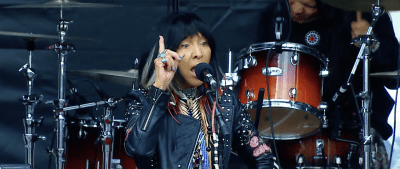15 NYC Bands You Need To Hear
Northside Festival has arrived. Hundreds of musicians will descend upon Brooklyn, but we have to keep reminding ourselves that for most, it’s a very short commute. Over half of the artists are NYC residents on a daily grind (like us!), and don’t get talked about nearly enough. In an effort to change that, we highlight several artists each year, and suggest listening to them as fast as humanly possible. Now more than ever music has gone from necessary to absolutely imperative. Musicians have responded to the social and political climate in many different ways, ranging from creating dreamworlds where we can escape, bringing places where we can howl in outright anger, and providing ways to form alternate identities to cope; we may look back in four years and thank music for being the one thing that kept us sane. It may be a shitty time for politics, but it is a great fucking time for music. Check out the Northside music lineup, and consider picking up a badge or some single-show tickets.
I.O.D.


Must Hear: “‘Round Here”
The crime rate in New York has been in free fall for decades (as any taxi driver will remind you driving through Bushwick) except in Brownsville, where it’s actually going up. Once you find out that Brownsville has the highest concentration of public housing in the country, all located in a single square mile, it becomes a lot more understandable. It also explains why the neighborhood hasn’t produced many hip-hop artists, given the day-to-day struggles. The rapper I.O.D. is from the Brownsville projects, and at 23 he is setting out to change that. “When somebody comes out of Bed-Stuy, it’s a trigger word—you get all this nostalgia for Biggie,” I.O.D. told Spin. “There’s not really an artist that came out of Brownsville who you feel that same nostalgia for. That’s why I’m repping so hard to change that. All it takes is one person to make it out of the neighborhood.” Written and recorded over the course of two-and-a-half years, TheTheThe Brownsvillain EP offers complex meditations on what it means to grow up in Brownsville. The project opens with the chime of a toy piano, the indisputable sound of innocence. It is a theme which I.O.D. returns to again and again over the course of eight songs, albeit often subtly. In the song “Forward” he defines a Brownsvillain over the low crackle of vinyl: “Someone born into being the enemy of society by conditions he couldn’t control.” In this moment, there is an acute self awareness—he asks “What is a villain, really?”
Much like Kendrick Lamar or fellow Brownsville native Ka, I.O.D, dissects on his own identity within social constructs through bare confessionals and dizzying raps. The debut EP is a glimpse into I.O.D’s sharp observations, discerning influences, and most importantly, what he might become.
Fielded


Must Hear: “I Choose You”
Years ago, my friends told me to see Fielded, the project of Lindsay Powell, and I (stupidly) never did. Of course, I let my New York life drag me around in a blur of years and it wasn’t until recently I finally made it to one of her shows. When I got there, she was setting up her gear on stage in a pair of ripped jeans, barely held together with a few safety pins. As I was watching, her small and unassuming frame turned forward, clutched the mic, and a deeply soulful voice poured out, filling the room.
Everyone inside was still, transfixed by her impossibly beautiful voice. She sings with her entire being, and you can’t help but imagine her walking into any jazz club in Chicago and silencing the room. Her approach to music draws from familiar pop tropes: vocals placed at the front and center, memorable choruses, and dramatic climaxes. However, she produces alien melodies, psychedelic sounds, and her lyrics are sharply perceptive. This year, she’s set to self-release a fifth full-length album, and is fully equipped to do so. Last year, she started touring with a band, opening for international acts, and creating artful music videos. Her new album was started in New York and fully formed over a month-long residency in Sweden at Composer’s Centre in Visby. She explains: “The new album is far more personal and confessional than any album I’ve made under any pseudonym. I’ve always been a little frightened to go too deep into my personal life. Since pursuing therapy in hopes to heal from sexual trauma, however, I’ve realized that my story is important for others who have or currently still suffer quietly, who feel they have no one to turn to, who feel eternally bad for events in their lives that are not they fault.” Her work has been compared to Kate Bush, Bjork, and Robyn which is certainly good company to keep.
Haram
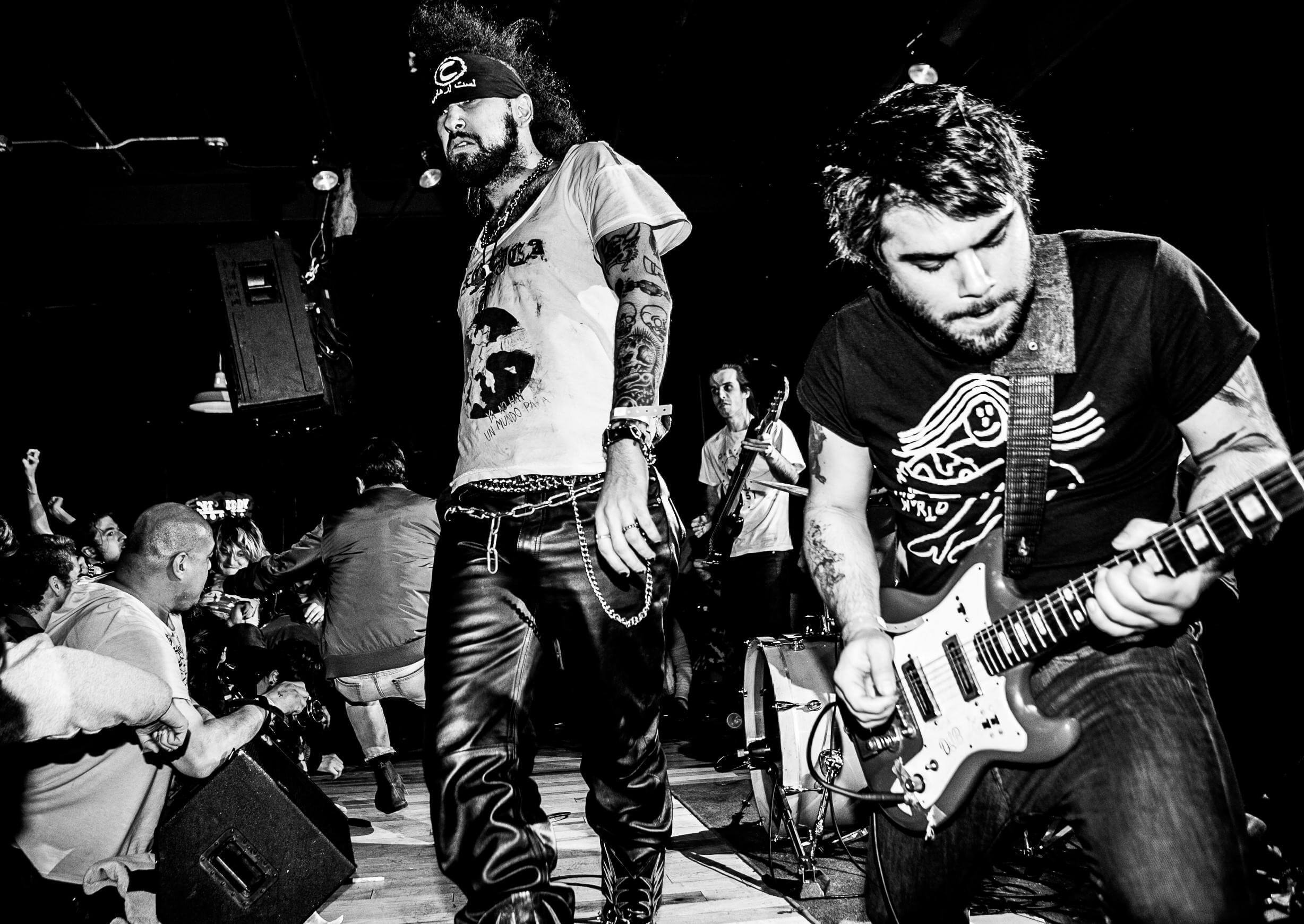

Must Hear: “What is This Hell?”
In a political climate where xenophobia and blind jingoism are scarily thriving, a punk band sung, spoken, and written entirely in Arabic is among the biggest firmaments of free speech, and perhaps the most daring defiance to ignorance. Haram is just that. Vocalist Nader Habibi comes from a Shia Muslim upbringing, and attended Catholic school in Yonkers. He’s dealt with bullying and discrimination his entire life, exponentially intensifying with every news headline of a terrorist attack. Haram is the direct product of frustrations he’s dealt with since birth, and an incredibly effective outlet, not only in solidarity with Middle Eastern punks, and Middle Easterners in general, but also out of contempt for his adversaries. The band only has a demo, and their blistering What Do You See EP, which came out last year on Toxic State, but they’re a total asset to the scene, and one of the most important punk bands currently playing. Choral guitar instills something of a dilapidated beauty, beneath which grainy bass and thunderous drums drive home at breakneck speeds. And, from lyrics and song titles and album art to Habibi’s stage presence, everything is brought to their primarily American audience in the language of an often-misrepresented group. Get acquainted with it, and them.
Mezzanine Swimmers


Must Hear: “Cinnamon Gurl”
Mezzanine Swimmers is the solo project of Mike Green, who has at one point cycled through every instrument in different bands. First, he tackled the drums, then moved on to guitar, next electronics, and finally ended up with an amalgam of everything. His approach to music is completely individualistic; it can barely be taught, let alone imitated. On his 2013 release Cougar Opaque, the drummer background is first perceptible first. The drum beats are a labyrinth of winding beats, from vaguely familiar samples to distorted sound bites, but never hesitant. Each song has a wildly catchy hook, and is dressed in woozy, garbled, and psychedelic textures. Like Container, he takes a tactile approach; the sound is sculpted from the mad combination of overdriven electronics and loose improvisation. You’ll never see a laptop on stage, but a pile of wires connecting synths, samplers and pedals. The result is a wonderful album of deranged pop songs which would be quite comfortable in a playlist with Black Dice or Michael Jackson. This fall he’s set to release Black Cat in Heat on Already Dead Tapes and Fire Talks Records.
Yaeji


Kathy Yaeji Lee’s voice moves through songs in a languid stride somewhere between spoken word and a washed texture. The lyrics slip seamlessly from English to Korean, and are often repeated until they’re cycling through your head—no matter what language they are in. The Brooklyn and Seoul resident is only 23 years old, which makes her debut Yaeji (Godmode) even that much more impressive. On first listen, the album can come off as a lackadaisical day trip, but her lyrics carry more weight with each digestion. In “Full of It” she repeatedly sings twisted phrases which demand contemplation “Distant like ignorance / Resistance / Full of it” and “My first words are silent but violent.” Drawing from deep house she uses hypnotic loops and fractured glitches to keep the songs turning corners. The sum of all the parts is a space for you to dream and dance, while the lyrics slowly but surely chip away at your guard, eventually seeping inside.
Vanity
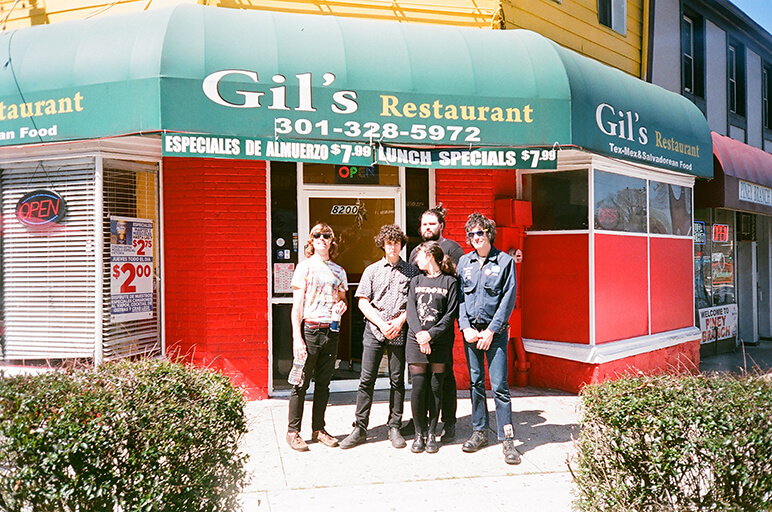

Must Hear:“You’ll Never Matter Much To Them”
Vanity’s been around for a minute, having released their debut Vain In Life LP in 2014, but the continuous honing of their infectious, riff-heavy rock sound, and their gaining momentum can only solidify them as one of NYC’s most exciting bands. Frontman Evan Radigan and Colman Durkee started the band as a street rock duo (Durkee having left to pursue other endeavors), and their seemingly ever-changing lineup has pushed outside the boundaries of a somewhat limiting genre, to include elements of glam (like on opener, “You’ll Never Matter Much To Them,” and the eponymous fourth track), blues (“Stay of Execution”), acoustic folk (“A Moment’s Peace” and closer “Let’s Keep Drinking”), and more. Whatever label you want to give their 2017 Katorga Works follow up, Don’t Be Shy, it’s undeniably their most accessible, innovative, and poppy material to date, yet still maintaining a voice founded in drunken New York nights and agitated clenched fists. There’s also a notable shift in Radigan’s vocal patterns, from more guttural and granular lows, to infectious high-range wails that make you wonder how they could even be coming from the same person.
Sneaks


Must Hear: “Hair Slick Back”
Interviewing Eva Moolchan about her project, Sneaks, is a lot like questioning a magic 8 ball. Her answers rotate from “Not especially” to “There’s no formula” to “It’s ever-changing.” Her music follows suit: minimal, concise, enigmatic, and calmly cool, all seemingly without trying. All she uses is a drum machine, bass, and deadpan vocals. In Washington D.C. she found a community of musicians, like Priests, who released her debut album Gymnastics on their label Sister Polygon. This tape demonstrated her ability to write punchy bass lines and complimentary beats over 10 songs. The album clocked in at only 14 minutes, but is wildly catchy. Her 2017 release on Merge is called It’s a Myth—it was recorded and produced by Mary Timony (of Helium) and her partner. The songs are pared down to skeletal two minute jolts of post-punk fervor and stony vocals. It, too, is a quick listen at 18 minutes, but each song has undeniable hooks and killer rhythms. In the past few months she transplanted to New York from the D.C. area, and with good fortune should find herself appearing on a lot more bills soon.
Peaer


If you take math rock, slow it down some, add fuzz and a bunch of meditative weight to it, you’ll wind up with Peaer. Peter Katz started writing intricately composed, soft-spoken songs under the name in 2011, in Connecticut. He’s since moved to Brooklyn, and started playing as a three-piece, able to further explore the melancholic side of math. 2014’s debut The Eyes Sink into the Skull acts as an appropriate introduction to the band’s stance on bearing emotionality on all sleeves, all the time. Constantly arpeggiating guitar embodies Katz’s mind, ill at ease, unable to sit with himself. And this only intensifies, to perplexing proportions, on their 2016 S/T album, incorporating more sludge, adding literal heft to the already contemplative sound. Harmonic twang and jerky rhythms put it on edge in all the right places, and then the tension breaks with the onslaught of distortion.
WETWARE


Wetware is the electronic duo of Roxy Farman and Matthew Morandi. They dance delicately on the lines of industrial dance music, noise, and straight techno. Yet there’s hardly anything melodic (or delicate) about the project—they allow pure percussion and effectual tones and delays move your body for you. They have an EP, entitled Salpinx, due out May 19 on Bank Records, and the lead single, “Fuck Them All,” is a hauntingly detached gestation of harsh and jittery electronics and percussion, with Farman’s low monotone in the middle of it, permeating through like an eerie molasses-like substance being introduced into water. And this goes for a lot of their catalogue, it seems. Their live presence is a cross between an expert DJ set and performance art; Farman romps about the room, hardly ever on the actual stage, with what must be the longest mic cable in production. Bodies contort and sway and sit down and twirl and stand, all while Morandi deliberates over modular synthesizer transitions like a strangely calm, mad scientist. It’s not to be taken lightly, nor to miss.
GRID
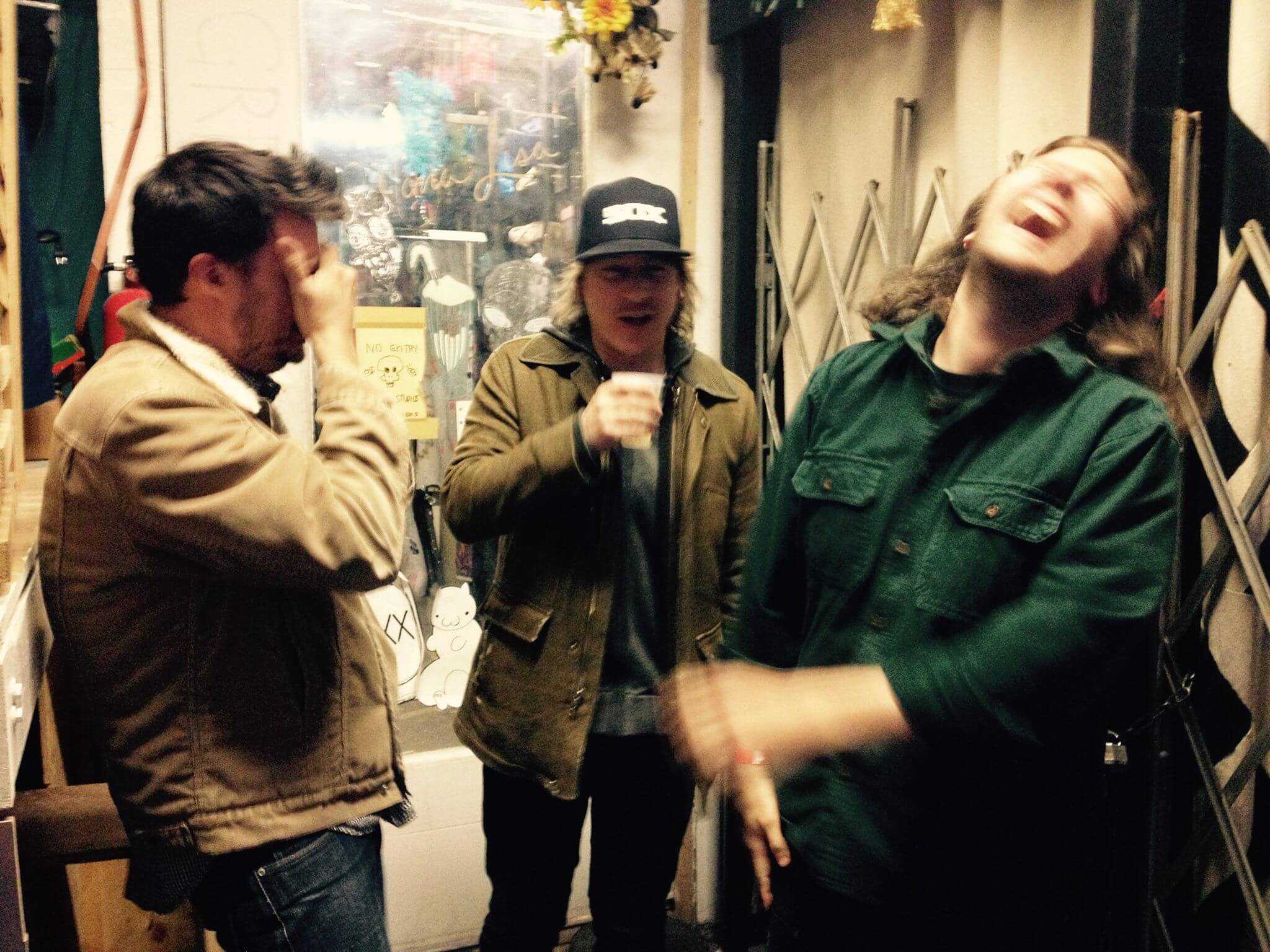

Matt Nelson, Tim Dahl, and Nick Podgurski make up what is undoubtedly one of the boldest, most bewildering, and by that nature, interesting, jazz improvisations you’ll ever hear or see. The trio released their debut S/T album earlier this year with NNA Tapes. In a live setting, or at least on big speakers, it’s a listening experience that means to swallow you whole, coat each and every inch of you with its drooling sludgy tongue. The tracks emerge and dissolve, slowly, building up to overwhelming proportions, and then fading away with the indifference of an epidemic. “Jazz,” in their case, is quite a loose term, as Nelson’s baritone saxophone is fed through so many effects, it sounds like a different instrument entirely, one not even of this world. Dahl’s bass is something haunting and foreboding, and this, combined with what comes out of that horn, can only be described as “other.” Podgurski adds a jittery, irregular pulse to the already unpredictable whole. Sparse and off-beat, the percussion always keeps the listener guessing.
Combo Chimbita
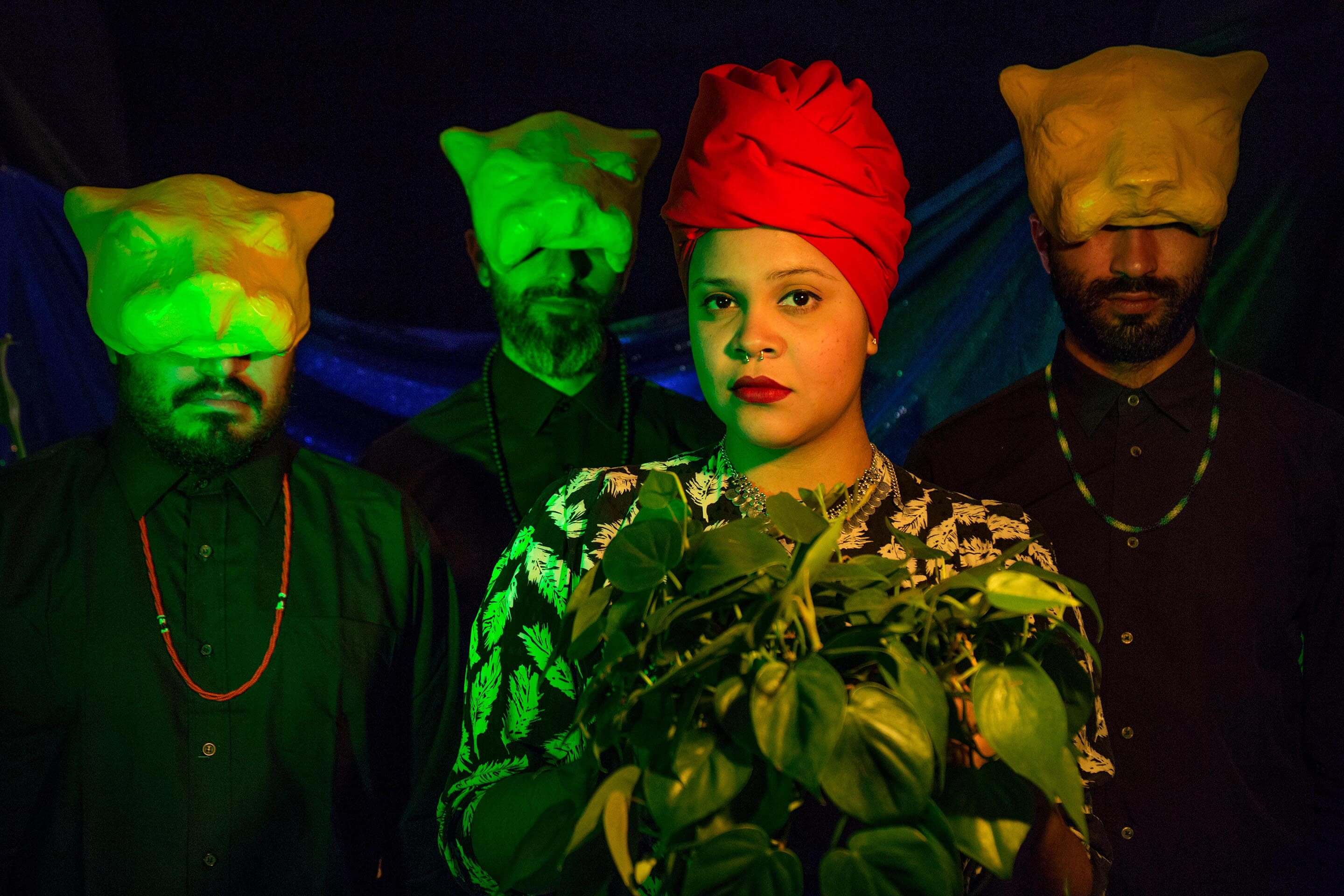
Must Hear: “Chimbita Theme”
Chimbita is a Colombian slang word for women, but it’s hard to translate exactly. The precise word doesn’t exist in English, and trying to convey it’s meaning captures a little bit of how the members of Combo Chimbita must feel as first generation Colombians living in New York City. Their first EP, El Corredor Del Jaguar, from 2014, is a lively display of their cultural roots through an American lens. The music feels warm and wild like the jungles of Colombia, but urban in it’s melding of styles. Three members of the band that done masks, play under as Dilemastrona, Niño lento, and Prince of Queens. The fiery vocals of lead singer Carolina Oliveros forge the way and command attention on stage. She plays the Columbian instrument called the guacharaca, which is made from a small palm and imitates birds singing. Their full length album Abya Yala will be out on the first day of summer, June 21, on Figure & Ground.
PsychoEgyptian

Must Hear: “LBDC”
Things don’t always fit into pretty little boxes on the hillside, as much as corporate America would like to have you believe. Mykki Blanco has been working outside the lines for over a decade, and in 2015 she created the label Dogfood MG to represent other artists outside the black American norm. Other artists include Violence, Yves Tumor, and Bushwick native Psycho Egyptian. Devin Kyle Cuthbertson devised the identity PsychoEgyptian: “It’s a way reconciling race and identity and power through the creation of an alternative space” he says. “Hip-hop is a form of fiction in and of itself, it’s a form of storytelling, and for me it’s important to have my own mythology to tell my story.” His path hasn’t exactly been linear: after dropping out of high school and subsequently being accepted into Cooper Union, he was eventually expelled, winding up in Riker’s Island after getting caught for graffiti vandalism. This is reflected in his twisted neon green curls and his cutting lyrics delivered over a patchwork of noises. But PsychoEgyptian still doesn’t see himself as a musician. “What I’m doing is still art. I’m creating a worldview, I’m creating a culture rather than creating just objects for rich people. I could do that too just as easily, and who knows, maybe one day I will.” His music goes beyond the sonic vibrations of noise and seeks to create spaces and push ideas.
Frank Hurricane


Must Hear: “Ying Yang Feather”
Last year, Frank Hurricane moved to NYC. From everywhere. He’s been all over the country meeting new homies and collecting new stories, and then singing about them. Frank says the word “holy” a good deal, and he describes himself as “spiritual mountain psychedelic gangsta folk,” and that’s probably pretty accurate. His latest album, Mountain Brew Light, out on Feeding Tube Records, is just his latest journal entry, infused with anyone or any combination of those words. He’s released a slew of records under his own moniker, and even more under Hurricanes of Love and Gangsta Love. The songs, for the most part, are acid trips in and of themselves, exploring and embracing life in ways that wouldn’t annoy a cynic, but rather, instill a sense of wonder at how someone could be so into their own existence. In a live setting, you’d see him sitting with his acoustic guitar on his lap, a modern day mystic finger-picking the strings, and telling a narrative that would sound more myth than life experience, were it not for his larger-than-life personality. A lot of the time, the “this next song is about…” is longer than the song, and some of it’s funny, and some of it’s sad, but either way, you know that this is a human who has lived some.
Cut Worms


Must Hear: “Think I Might be in Love”
Max Clarke moved to NY from Chicago a couple of Decembers ago, bringing the Cut Worms moniker, and its distinctly vintage sound, with them. Upon a first listen to their At Home EP, or any one of the Soft Boiled Demos of last year, one might think these were the lost recordings of a 1950s folk genius. Clarke’s music longs for a simpler time, and it’s a much needed breath of fresh (old) air in times of overproduction and overall capitalist chaos. A calmly strummed acoustic guitar and a real deal piano are all it might take to transport you to another world, an all too temporary visit to Pleasantville. Clarke’s forlorn, beautifully simplistic vocal harmonies do more to pull at heartstrings than the most excessive vocal gesticulations. It’s hard not to imagine the songs aren’t emanating from the living room record player while you sit on the porch swing. The modern world might not be for everyone, and Cut Worms wants to tell you that’s ok.
OSHUN
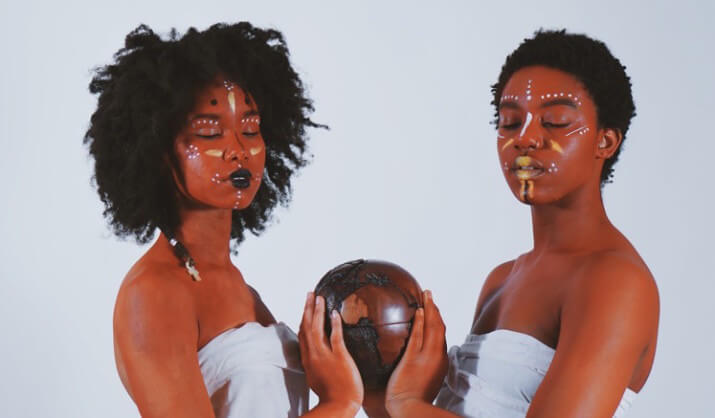
Must Hear: “Sango”
Thandiwe and Niambi Sala have been conscientious of their perception by the world from the beginning. That’s why they’ve carefully labored over all of the choices and meanings behind them. Their name, Oshun, is taken from a West African diety, essentially equating to mother of love, fertility, wealth, and diplomacy. The two met at NYU where they immediately complimented one another; Thandi was studying journalism and Africana studies while Niambi was studying recording and engineering. Hyper-focused and aware, they wanted to define their music from the very beginning. They named their music “Iya-Sol” and described it as containing elements of hip-hop, gospel, and R&B. The songs unfold softly like lullabies, and just like the best lullabies, have a comfort in the meaning they offer. Their debut AFAHYE explored these sounds, and in 2014 and 2016 they fleshed out an entire vision on LP ASASE YAA. This year, they released the track “Not My President” with the following statement:
“This is an unapologetic public service announcement for everyone and anyone who needs to be reminded that NO MAN HAS DOMINION OVER US.”
Collage by Sarah Lutkenhaus
You might also like 














